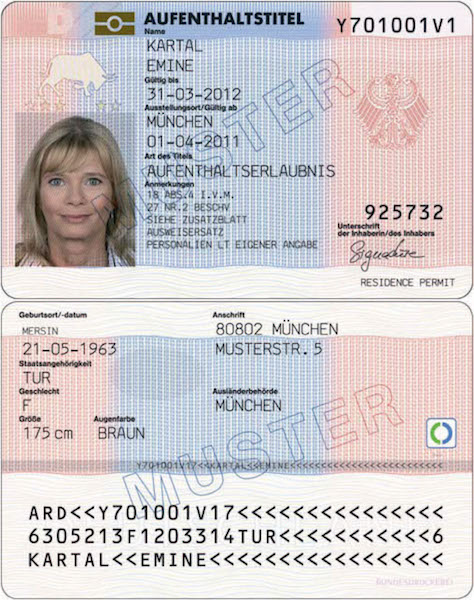Of all European countries, Germany is notable in offering British expats the least generous transition period – 3 months – to permanent residence status post-Brexit … assuming Brexit ever happens.

LAURA KAYE
That said, immigration officials in some parts of Germany are already pushing ahead to register British residents and issue residency permits despite the fact that almost three years after Brexit, no one has a clue what’s going to happen.
Dispatches Berlin contributor Laura Kaye alerted us that, despite the recent extension of Article 50, her local Ausländerbehörde, or Foreigners Registration Office, is pushing to get Brits registered and processed by the end of June.
From her email:
Thought you might like to know that Germany is issuing residency permits in advance of Brexit. They emailed us with an appointment date a couple of weeks ago. I went for my appointment today and was told we qualify for unlimited residency. We need to go back because my husband was travelling for work at the time, but other Brits were walking out with their visas already.
GERMAN EFFICIENCY
Germany is home to at least 100,000 British expats, most of whom are either corporate nomads, or are married to German nationals. There are an estimated 16,000 Brits in Berlin alone, the largest expat community in Germany’s capital city.
 Berlin already is issuing permanent residency titles, or unbefristete Aufenthaltstitel, to those who meet the requirements, including 5 years of residency in Germany.
Berlin already is issuing permanent residency titles, or unbefristete Aufenthaltstitel, to those who meet the requirements, including 5 years of residency in Germany.
Others are being issued temporary residence titles, which will be replaced by permanent residence titles once they’ve been in Germany for the requisite amount of time.
Brits living in Berlin were asked to register online earlier in the year, and immigration officials have begun to email those who registered to invite them to appointments at their local Ausländerbehöde to submit residency applications.
In an effort to fast-track this process, registration offices are even opening for additional hours, especially for those with allocated appointment times. When Laura arrived for her appointment, she found just two other people – both British – in the waiting area.
ABOVE AND BEYOND
“This wasn’t my first experience with German bureaucracy. I was expecting to be waiting for hours,” Laura said. “But my number was called as soon as I arrived.”
The immigration official handling her application confirmed this was not usually the case and warned her to expect far more people and a much longer wait at any future appointments.
“We’re usually closed on Friday. We’ve opened today just for you,” she told Laura with a smile and explained the intent is to process all British applicants before the end of June.
She described the interview as “surprisingly laidback.
“We had spent quite a lot of time gathering together a big stack of documents for the appointment, and in the end, they didn’t need to see most of it. In our case, after living here for more than five years, almost all the information they needed was already in the system,” Laura said. She cautioned this may not be the case for everyone.
“This wasn’t what I was expecting. The whole thing basically felt as if it was just a formality. It was all very straightforward,” said Laura. “After so much time worrying about our status here during all this confusion, it was a huge relief.”
While Laura‘s family will have to return for a second appointment once her husband returns from international travel, other Brits in attendance that day were given residence permits then and there.
“Another woman came out (of her interview) and showed us the visa in her passport,” Laura said.
BRITS HAVE RIGHT TO STAY … UNTIL THEY DON’T
Some concerned commentators have understandably been questioning why Germany is issuing residence titles to British citizens, who are, of course, until further notice, still European Union citizens.
The general understanding among British expats who are following events closely is that this is Berlin’s attempt to get ahead of the game in case of a no-deal, or “disorderly” Brexit.
With so many people to register within a potentially very short period of time, it makes sense for them to “get the ball rolling” and do so proactively, Laura said.
Given the extension of Article 50, British citizens living in EU countries still retain their rights as EU citizens and therefore don’t yet require any form of residency title to live and work in Germany. But after several years of uncertainty, should things suddenly move forward with Brexit (though we’re not holding our breath), it will come as a huge relief to many British expats to have their rights formally tied down in advance.
“At the moment Brits have a legal right to stay here… until we don’t. So right now, our rights as European citizens supersede the visas they’re handing out … until they don’t. Whatever happens next, we’re just glad to know our rights will be secure now,” Laura said.
According to the Berlin official city website, “Should the United Kingdom’s departure from the European Union be stopped, all data gathered by the Berlin Foreigners Registration Office on the online form will be deleted immediately.” And, presumably, any proactively issued residency titles will remain unnecessary and become null and void.
BERLIN IS NOT GERMANY
But what of other areas of the country?
One interesting detail is that despite all being subject to the same federal immigration policy, different German states appear to be approaching the situation quite differently. And while Berlin may already be proactively issuing residency titles, at the time of writing, Brits in many other parts of Germany are being told to sit tight and await further notice.
To add to the confusion, some regions appear to have no clear consistent policy at all, with different officials handing out very different information (or misinformation). And from the conversations in expat forums, the only thing that is clear at the moment is there remains no clarity.
Which means for many British expats the confusion and uncertainty continues.
More info:
• Here’s the official German website laying out all scenarios including the United Kingdom leaving the European Union with a deal and a “disorderly transition.” It also has detailed explanations of travel during the transition periods.
• The UK government has compiled a list of German Foreigners Authorities with links to the latest information from each local city/region here.
Co-CEO of Dispatches Europe. A former military reporter, I'm a serial expat who has lived in France, Turkey, Germany and the Netherlands.

















